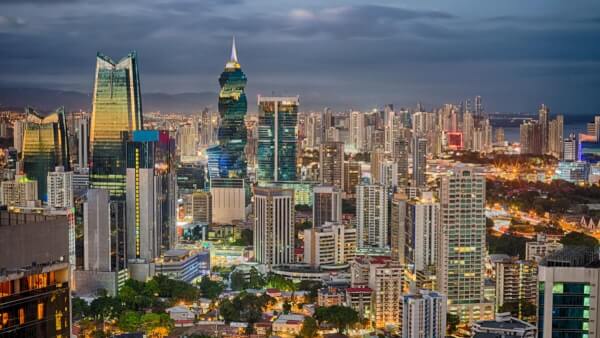American banks in Panama: branches and more
Read on to find out what US banks have branches in Panama and tips on banking in the country.

Historically thought of as not much but a tax haven for the über wealthy, Monaco is often overlooked as a place to really “live.” However, today the expat population in the world’s smallest country is on the rise, and it’s easy to see why. Between financial security, real estate security and physical security - with one of the lowest crime rates in the world - the beautiful European country has become the final destination for many an expat, especially those who need to frequently travel around the continent.
If you’re moving to Monaco, chances are you’ve already considered how you’ll be handling your finances. However, navigating the process on your own can be tricky, even in a country where English is nearly ubiquitous. As such, this guide will help walk you through everything you need to know about how to open a bank account in Monaco.
Absolutely, residents and non-residents alike may open accounts in Monaco.
In order to open an account, you’ll need to go to the bank and meet with a banker. You can and are advised to make an appointment before you go, mostly to ensure you get an English speaking banker. If your French is perfect, you may be able to just walk in.
Assuming you arrive with all the necessary documents and fill out the application to the bank’s satisfaction, accounts are typically opened within seven working days.
It’s a good idea to call the bank ahead of your appointment to see exactly what documentation you’ll need to bring with you, however, the following documents are a good place to start:
While Monaco is well known for its financial institutions, unfortunately, they haven’t totally caught up in the world of modern banking. Most banks won’t offer online banking services at all, and those that do still don’t allow you to open an account online.
If you’re determined to open your account without being physically present in Monaco, your best options are to either choose a large international bank with a branch in your home country, or to hire a lawyer in Monaco and give them power of attorney to handle the process for you.
No matter where you go in the world banks charge fees. While these vary bank to bank, they’ll typically include maintenance charges, transfer fees and withdrawal fees. Some of the most common types of charges are listed below.
While you won’t run into any fees for withdrawing cash from one of your bank’s ATMs, you’re likely to get hit with a charge for using an ATM from a different network. This fee can run from €1 to €6, depending on your bank and the bank whose ATM you’re using.
If you’re planning to use a debit card from your home country, there are a couple of things to look out for. The first is the exchange rate; ATMs can often charge a significant markup, and if you’re not aware of themid-market rate you may not even notice this fee. The second is the foreign ATM fee itself, which is comprised of the ATM’s base fee plus a percentage of your total transaction, which goes directly to your bank at home. All in all, using a foreign debit card isn’t advised for ATM withdrawals.
While most banks have lowered or eliminated most standing fees, you'll probably see a nominal monthly maintenance charge (between €2 and €50 depending on your account type and how much cash you keep in it).
You’ll also be charged a fee if your account dips below your required minimum balance, so make sure to keep a close eye on your funds.
International transfer fees can be pretty significant, depending on how much money you’re moving around. Typically, the sum is made up of a flat charge up to ~€20, a percentage of the amount, and a markup on the exchange rate, which is often not obviously disclosed by your bank. To make sure you’re getting the best deal, it’s a good idea to keep an eye on the mid-market rate, or use Wise to not only get the real rate, but to cut back on fees through their unique system of breaking international transfers into smaller local ones.
Ultimately, the bank you choose should be based on its proximity to where you work or live, the services you need most and its requirement for minimum balance and how that suits your needs. You may also want to consider whether to choose a national or international bank, the latter sometimes being a better choice if you travel often or deal in multiple currencies. With that all in mind, some of the most popular banks in Monaco include:
One of the bigger international banks, Barclays Wealth Monaco only has one branch in Monaco, in Monte Carlo. While this may not seem like much, given the country’s tiny size and the bank’s lax ATM fee policies, most Monaco residents don’t consider this to be much of a hindrance, and it’s still one of the most favored banks in the country. Some benefits include:
Often favored for its large network of branches around the world, like Barclays, HSBC only has one location in Monaco, between Monaco City and Monte Carlo. Despite the lack of locations, customers often choose HSBC for its many benefits, such as:
A Swiss bank with a lot of prestige, Julius Bär is unique in that the bank offers an open product and service platform, allowing individuals to tailor their banking to exactly what benefits and services they need. As such, it’s impossible to list all the perks Julius Bär account holders have access to, but it’s an important bank to keep in mind - especially for high net worth individuals.
One of very few banks with multiple Monaco locations, BNP Paribas has a presence in three separate cities in the tiny country. Account holders enjoy benefits like:
If you regularly pay or get paid in multiple currencies, you may want to consider a Wise borderless account, which supports EUR, USD, and GBP, and will have have consumer debit card support by the fall of 2017. No matter what bank you choose, using Wise to move money between your account in Monaco and your account abroad is the best way to ensure you’re getting the real exchange rate and cutting back on fees.
Monaco is the home of some of the world’s most established and secure financial institutions, and no matter which bank you pick you’re sure to be well served. Good luck opening your account!
*Please see terms of use and product availability for your region or visit Wise fees and pricing for the most up to date pricing and fee information.
This publication is provided for general information purposes and does not constitute legal, tax or other professional advice from Wise Payments Limited or its subsidiaries and its affiliates, and it is not intended as a substitute for obtaining advice from a financial advisor or any other professional.
We make no representations, warranties or guarantees, whether expressed or implied, that the content in the publication is accurate, complete or up to date.

Read on to find out what US banks have branches in Panama and tips on banking in the country.

Read on to find out what US banks have branches in Portugal and tips on banking in the country.

Read on to find out what US banks have branches in Italy and tips on banking in the country.

Read on to find out what US banks have branches in Germany and tips on banking in the country.

Find out what Remitly's global membership program, Remitly One, offers, and the fees and requirements to be aware of.

Read on to find out what US banks have branches in India and tips on banking in the country.